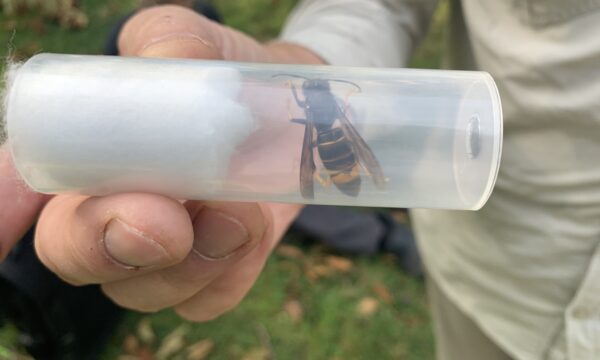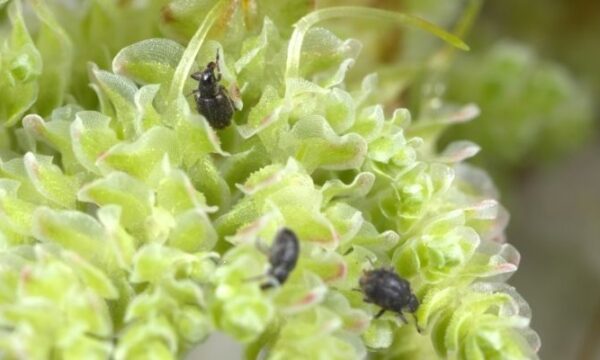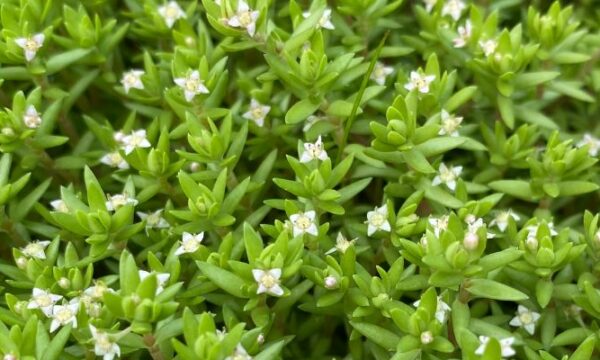
Parthenium hysterophorus is a highly destructive weed which has invaded and is widespread in around 48 countries in Africa, Asia, and the South Pacific. In Pakistan the weed is spreading rapidly westwards and southwards across both rural and urban landscapes, affecting native ecology and harming agriculture.
It is widely acknowledged that in managing invasive species, integrated control is the most effective strategy. This involves the use of herbicides, manual or mechanical control, and biological control agents in an integrated way.
The biological control of parthenium in Pakistan is focused mainly on Zygogramma bicolorata, also known as the parthenium leaf beetle. The beetle feeds on the leaves of parthenium and is already being used as a biocontrol in Australia, South Africa, India, Ethiopia, Uganda, and Tanzania.
In October 2018, CABI held a two-day workshop in Islamabad with the aim of revising a comprehensive national action plan to tackle parthenium in Pakistan. During the workshop, a group discussion raised the point that a survey should be carried out to investigate the presence of Z. bicolorata on parthenium, and in areas where it is not found, to release the beetle there. Studies have shown that Z. bicolorata is already present in Northern Punjab, Khyber Pakhtunkhwa provinces, and Kashmir. By redistributing the beetle to suitable yet not occupied areas would mean that the biological control agent will have been released throughout parthenium’s range in Pakistan.
In October of 2018, surveys were made at selected sites in Sindh province and ultimately two farms with confirmed Parthenium but no Z. bicolorata were chosen as redistribution sites. Although the farm managers were initially reluctant at the idea of introducing a new insect to their land, CABI staff explained in detail about the benefits of the parthenium leaf beetle, which convinced the farmers to allow the use of their land. Each farmer assigned areas within their farm and 350 insects were released at the first farm and 600 at the second.
Earlier this month, CABI scientists returned to these sites to see if the Z. bicolorata had had any effect. Since the weather is colder at this time of year, the researchers found that all the insects had gone into diapause in the soil. Parthenium plants in the field were removed using a rotavator by the farmer, which is standard practice. In addition, in spite of the many parthenium plants which remained on the field edges there was no sign of any adult beetles. The sites will be revisited again in mid-March when the weather is more suitable for the emergence of diapause adults.
Whilst Z. bicolorata has been used successfully as a biological control agent in other countries, these findings highlight a big limitation of this beetle in Pakistan in particular – the asynchrony between the insect and the emergence of parthenium weed. By early spring (February-March), parthenium is already starting to sprout but Z. bicolorata can emerge as late as June, giving the weed plenty of time in the interim to develop and produce seeds unhindered.
- Zygogramma bicolorata
- Parthenium flowers
However, research has begun at the CABI labs in Rawalpindi and is attempting to break diapause early in order to make releases of Z. bicolorata in spring. Scientists are running experiments on two sets of Z. bicolorata, one under natural conditions and one under control conditions. Each day the beetles are provided with fresh parthenium leaves and data collection is ongoing until all the insects go into diapause. Later this year in March, attempts will be made to break the diapause of Z. bicolorata by manipulating the environmental conditions in the controlled experiment. “If we are successful in breaking diapause of Z. bicolorata adults in these experiments, we’ll then be able to multiply these insects under lab conditions,” reports Dr Kazam Ali, who is working on the experiments. This research will also assess the impact of early releases on parthenium growth and reproduction to determine whether it is indeed an effective biological control strategy.
Additional releases of Z. bicolorata will also be made in spring or early summer to check its development on parthenium in the field and their survival will be monitored according to the protocol.
Useful resources:
- CABI Invasive Species Compendium: Parthenium portal
- CABI Bookshop: Parthenium Weed: Biology, Ecology and Management
6 Comments
Leave a Reply
Related News & Blogs
Training on mass production of entomopathogenic nematodes for biological control of invasive insect pests
A team of global experts in the production of biocontrol agent provided a practical training on the mass culture of entomopathogenic nematodes at the Biocontrol Agent Facility of Rwanda Agriculture and Animal Resource Development Board (RAB), writes Dr…
20 December 2023










[…] Zygogramma bicolorata released at selected sites in Pakistan as biological control of parthenium […]
[…] Dr. Umair Safdar then discussed the activities of the CABI pilot programme in Sheikhupura and Islamabad and showed the documentary and public service messages on parthenium to the […]
[…] Zygogramma bicolorata released at selected sites in Pakistan as biological control of parthenium […]
Sorry to say that BC services seems to be nil to negative during this quarter century because of non interested in their duties this may be due to incompetent cum inefficient staff/so called scientists. Blind majority belonged to specific spoken language.
In my humble opinion if parity is implemented among scientists, this will create heterogeneous positive competition, otherwise monotony, shall remain as usual.
This submission for the betterment of knowledge based research.
Otherwise everyone is observing the stand still advocates based policies and their results.
Almighty Allah SWT Bless us
A A Khan
[…] Zygogramma bicolorata released at selected sites in Pakistan as biological control of parthenium […]
Much thanks to you for going to bat for horticulture and getting this issue settled! Keep doing awesome. alimiau